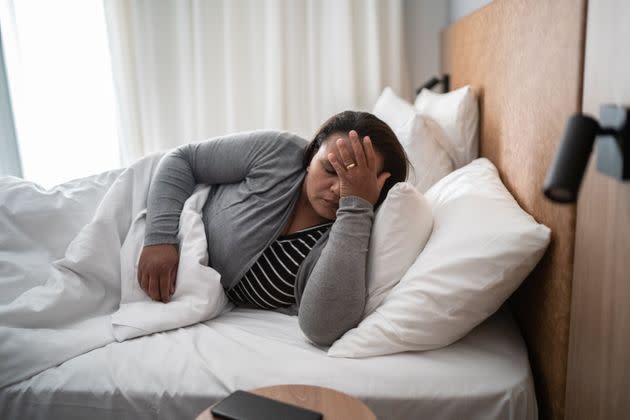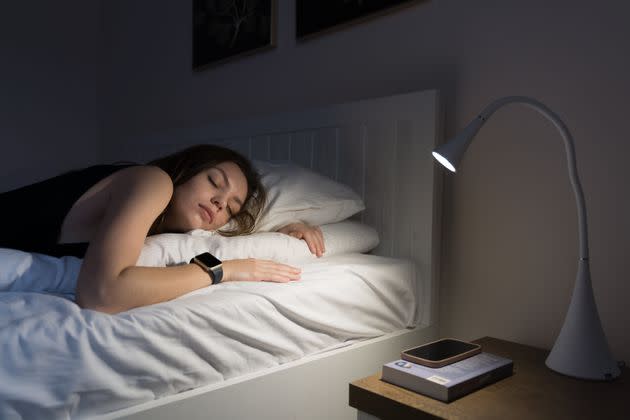What's Better: Short, Deep Sleep Or Longer, Lighter Sleep?

We’ve all been there: Maybe you were frantically packing for a trip and only got a few solid hours of sleep before it was time to wake up. Or perhaps you went to bed at a decent hour but were so stressed about work you didn’t get restorative rest.
Whether you tend to lie half-awake in bed for seven hours or completely zonk out for a few short ones, you may wonder how these different sleeping patterns are affecting your health. What is better: a short, deep sleep or longer, lighter sleep?
Simply put, experts agree that it’s not as straightforward as aiming for one kind of slumber over the other.
“Neither short, deep sleep only nor long, light sleep only is sufficient to completely benefit from good restorative sleep,” Dr. Temitayo Oyegbile-Chidi, the chair of the National Sleep Foundation, told HuffPost. “All four stages of sleep are necessary for brain restoration.”
These four individual stages of sleep include N1and N2, which are considered “light sleep.” The third stage is N3, which is also referred to as deep sleep and slow-wave sleep. And lastly is rapid eye movement, or REM, sleep. Over the course of the evening, a person cycles through these stages an average of four to six times.
According to Carleara Weiss, a sleep scientist and research assistant professor at The State University of New York at Buffalo, light sleep reduces heart rate and respiration, lowers body temperature and relaxes muscles.
On the other hand, the deep-sleep stage helps to repair tissue, strengthen the immune system and facilitate cognitive development. REM sleep, when most dreaming occurs, plays a vital role in emotional processing and memory consolidation.
“The balance of all these stages allows for proper functioning the next day, as well as memory consolidation, emotional processing and optimal functioning of body systems,” said Dr. Oren Cohen, an assistant professor of medicine at the Icahn School of Medicine at Mount Sinai in New York City.
Getting a full night’s rest, in which you reach all four stages of sleep, is ideal. That said, catching a bit of shut-eye is better than not snoozing at all.
“A short nap ― up to 30 minutes ― should be an excellent way to refresh if someone does not sleep well,” Weiss said. “It gives relaxation from light sleep without feeling ‘groggy’ when you wake up from deep sleep.”

How To Get Optimal Sleep
Though there are commercially available sleep trackers that aim to measure time spent in each sleep stage, this data isn’t always accurate. (These devices can, however, help you gain general insight into your slumber patterns.) Cohen explained that “there is not much that you can do to change your sleep architecture.” By and large, your genetics and circadian rhythm, also known as the internal biological clock that regulates your sleep-wake cycle, determine how much time you spend in each sleep phase.
“Rather than focusing on getting the ‘right’ stages of sleep, I think what’s important is asking ‘Am I getting enough sleep, and is the sleep that I’m getting refreshing?’” said Dr. Vishesh Kapur, a spokesperson for the American Academy of Sleep Medicine and a professor of medicine at the University of Washington.
Cultivating healthy sleep hygiene habits and creating a restful environment don’t have to be complicated. “It really comes down to basics, including a minimum of seven hours in bed,” Kapur explained. “The second is to do it on a consistent schedule seven days a week.”
Paul Harris, the medical director at health company Soaak Technologies, explained that your room should be as “cool, dark and quiet” as possible. Investing in an eye mask, blackout shades or ear plugs can improve your sleep. Moreover, if you have allergies or sensitive skin, consider swapping out old bedding with hypoallergenic pillows and sheets ― and wash them regularly.
Weiss noted that common signs that you’re not getting enough restorative rest include “waking up tired or with a headache, dry mouth, mood swings, excessive daytime sleepiness, fatigue and frequent need to nap.” At this point, you may benefit from speaking with a sleep specialist and exploring if there is an underlying issue at play.
More than 50 million U.S. adults have a sleep disorder, with common conditions including insomnia, obstructive sleep apnea and restless legs syndrome. In the long term, chronic sleep disruption and deprivation are linked to serious health issues, including increased risks of heart attack, hypertension, dementia and diabetes.
Ultimately, each stage of sleep is essential to your brain, body and overall well-being. “It’s not just about the duration but the quality of sleep,” Harris concluded. “Striking the right balance is key for optimal health.”

